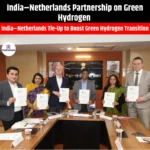|
General Studies Paper III: Environmental Pollution and Degradation, Water Resources |
Second Blue Talks Held in India
Why in News?
India, in collaboration with France and Costa Rica, hosted the Second Blue Dialogue in New Delhi on 20 May 2025. The aim of the meeting was to promote global unity in ocean conservation and to develop a coordinated approach.
Key Highlights of the Second Blue Talks Held in India
- Organisers:
- On 20 May 2025, India’s Ministry of Earth Sciences hosted the Second Blue Talks in New Delhi, strengthening its commitment to marine sustainability.
- The event was held in partnership with France and Costa Rica, reflecting a growing international alignment on oceanic issues.
- Key Dignitaries:
- This talk was chaired by Dr. M. Ravichandran, Secretary, Ministry of Earth Sciences.
- The platform witnessed participation from scientists, policymakers, industry leaders, academics, civil society, and international stakeholders.
- White Paper:
- A special White Paper was released during the event.
- The title was “Transforming India’s Blue Economy: Investment, Innovation and Sustainable Growth.”
- The document emphasised investment, innovation, and policy coordination to make India’s Blue Economy sustainable and inclusive.
- The effort highlighted the involvement of 25 central ministries, coastal states, and Union Territories.
- Central Themes:
- Conservation, management, and restoration of marine and coastal ecosystems: Special emphasis was placed on safeguarding marine biodiversity and restoring degraded coastal zones.
- Ocean science, education, and technological cooperation: Participants stressed improving ocean health through advanced technologies and research collaboration.
- Reducing land-based marine pollution: The need for coordinated policies and awareness to prevent waste, chemicals, and litter from entering the ocean was highlighted.
- Interlinkages among climate, ocean, and biodiversity: Focus was given to understanding these interconnections for informed policy formulation.
- Additional:
- The event served as a key milestone in the lead-up to the Third United Nations Ocean Conference (UNOC3), scheduled for 9-13 June 2025 in Nice, France.
- It reflected the continuity of “Chennai High-Level Principles” during India’s G20 Presidency.
- Innovations like Seaweed Farming, Smart Ports, and Eco-friendly Ship Recycling were also appreciated during the conference.
What are Blue Talks?
- Introduction:
- Blue Talks is a multilateral dialogue platform that brings together governments of various countries, scientists, academics, civil society, and private sector representatives to develop global consensus for the sustainable use and conservation of ocean resources.
- This platform not only focuses on the crises affecting marine ecosystems.
- Earlier, New Delhi hosted the first Blue Talks in February 2024.
- Objective:
- Global cooperation for marine conservation: The primary aim of Blue Talks is to promote a culture of dialogue and cooperation at the global level for marine conservation. Participating countries, scientists, and other stakeholders deliberate on marine biodiversity, pollution, ecological degradation, and climate change to formulate joint strategies.
- Blue Talks advances SDG 14: Life Below Water, pushing for practical, global cooperation to restore ocean health and address marine degradation.The platform emphasises developing practical strategies for marine ecosystem protection, pollution reduction, sustainable exploitation of fishery resources, and ocean health.
- Scientific innovation: Blue Talks also serve as a forum to promote innovation in the field of marine science and technology. Partner countries collaborate on marine climate data collection, depth measurement, seafloor mapping, and exploration of marine biological resources.
- Blue Economy: A significant aspect of Blue Talks is its vision to perceive the ocean-based economy (Blue Economy) as a model of sustainable and inclusive development. Ocean-linked activities like fishing, maritime transport, offshore energy, and coastal tourism are promoted to evolve in an environmentally friendly and long-term manner.
Introduction to the United Nations Ocean Conference (UNOC)
- Introduction:
- The United Nations Ocean Conference (UNOC) is an international cooperative platform for the protection of global marine ecosystems, offering scientific, technical, and policy-based solutions to tackle complex ocean-related challenges.
- Oceans are not only centres of unique biodiversity; they are the largest carbon sinks on Earth, playing a crucial role in controlling climate change.
- This conference gathers various stakeholders to discuss issues such as plastic pollution, marine debris, climate change, environmental impacts of shipping, and marine planning.
- The United Nations Ocean Conference (UNOC) is an international cooperative platform for the protection of global marine ecosystems, offering scientific, technical, and policy-based solutions to tackle complex ocean-related challenges.
- Objective:
- The aim of the conference is to ensure the protection of oceans and to develop a shared strategy for their sustainable use at the global level.
- It strives to build a future where healthy oceans offer economic opportunities, ensure clean air and water, and strengthen the resilience of global communities.
- Past Conferences:
- The first Ocean Conference was held in June 2017 in New York, co-hosted by Fiji and Sweden.
- The second Ocean Conference was held from 27 June to 1 July 2022 in Lisbon (Portugal), co-hosted by Kenya and Portugal.
- The dialogue focused on partnerships, solutions, and progress review under the Decade of Ocean Science (2021–2030).
- Upcoming Conference:
- The session also set the stage for the upcoming UN Ocean Conference (UNOC3) in Nice, France (9–13 June 2025), where global stakeholders will unite for decisive ocean action.
- It is being organised in partnership between France and Costa Rica.
- Its main objective is: “Accelerating Action with All Stakeholders for Ocean Protection and Sustainable Use.”
- The conference will bring together all 193 member states, the United Nations system, international financial institutions, non-governmental organisations, the scientific community, private sector, local communities, and indigenous peoples.
- Special Events – Three Major Programs Prior to the Conference:
- One Ocean Science Congress (4–6 June 2025, Nice)
- Blue Economy and Finance Forum (7–8 June 2025, Monaco)
- Ocean Rise & Coastal Resilience Coalition Launch (7 June 2025, Nice)
Major Global Initiatives of the United Nations for Oceanic Ecosystem Protection
- Decade of Ocean Science (2021–2030): The UN Decade of Ocean Science (2021–2030) drives a global push to power ocean recovery through bold, collaborative science—turning knowledge into action for a healthier marine future.
-
-
- Under this decade, various countries, scientific institutions, marine communities, and policymakers are brought together on a common platform to promote ocean-related scientific projects.
-
- Marine Protected Areas (MPAs): Marine Protected Areas, abbreviated as MPAs, are designated zones that ensure safe habitats for marine life, where human activities are regulated or completely prohibited.
-
-
- Through these areas, protection is ensured for coral reefs, fish species, marine mammals, and other vital creatures’ natural habitats.
-
- International Agreement on Marine Biodiversity: The “Agreement on the Conservation and Sustainable Use of Marine Biodiversity of Areas Beyond National Jurisdiction (BBNJ)” provides a legal framework for the vast parts of the ocean located beyond any national borders.
-
- This agreement addresses key issues such as sustainable use of biodiversity, sharing of genetic resources, and transfer of marine technology on a just and equitable basis.
- Other UN-Supported Efforts: Platforms like GEOS (Global Ecosystem for Ocean Solutions) are promoting innovative solutions.
- Through Blue Finance, financial support is being ensured for sustainable ocean projects, while Regional Seas Programmes encourage local-level participation and implementation in various oceanic regions.







